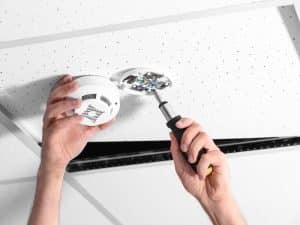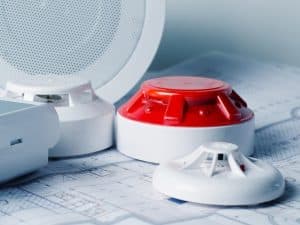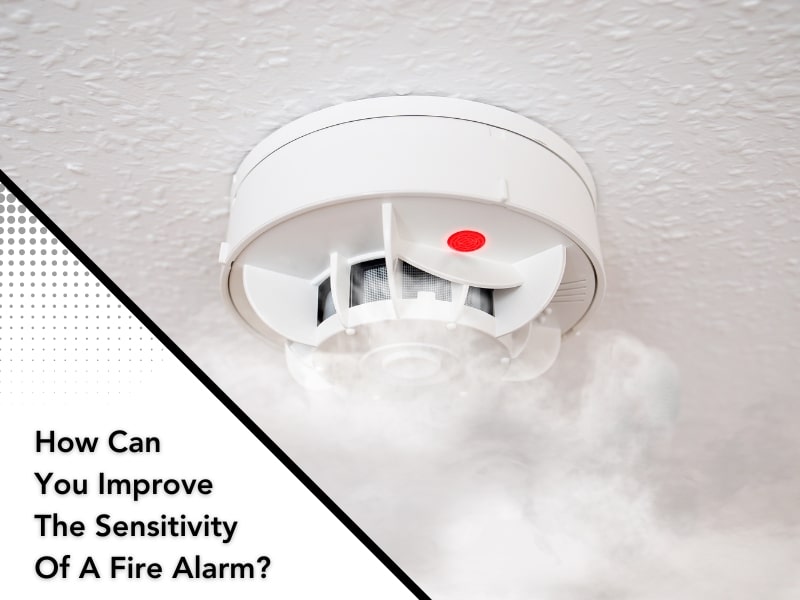Fire alarms are crucial in protecting your home or business from fire hazards. Ensuring your alarm is sensitive enough to detect smoke or heat quickly can mean the difference between safety and disaster. This article will explore how you can enhance the sensitivity of your fire alarm, ensuring reliable detection when it matters most.
What factors affect fire alarm sensitivity?
The sensitivity of a fire alarm depends on several factors that influence its performance. Understanding these can help you maintain and improve the effectiveness of your fire detection system.
- Type of fire alarm: Different alarms, such as ionization, photoelectric, or dual-sensor alarms, have varying sensitivities. Ionization alarms are more responsive to fast-flaming fires, while photoelectric alarms excel at detecting smoldering fires.
- Environmental conditions: Dust, humidity, and temperature fluctuations can impact the sensitivity. Dust accumulation can block sensors, while high humidity can lead to false alarms or decreased sensitivity.
- Age of the alarm: Fire alarms can become less effective over time. Components can wear out or become less sensitive due to age or exposure to environmental factors.
- Installation quality: Proper installation is vital for optimal sensitivity. Incorrect placement or poor wiring can reduce performance and reliability.
- Maintenance: Regular maintenance, including testing and cleaning, affects your alarm’s sensitivity. Neglect can lead to decreased responsiveness. This is crucial for ensuring your system performs at its peak. In addition, adhering to fire alarm system maintenance best practices will help prevent malfunctions and provide early detection of fires.
How often should you test your fire alarm?
Regular testing is essential to ensure your fire alarm functions correctly. Here’s how often you should test:
- Monthly testing: Test your alarm at least once a month. This simple action ensures the system works and gives you peace of mind.
- Battery replacement: Ensure batteries are replaced at least yearly or when the alarm signals a low battery condition.
- Professional inspections: Schedule a professional inspection of your system at least once a year. Experts can assess sensitivity and overall performance.
- After environmental changes: If you’ve recently completed renovations or your environment has significantly changed (like increased dust), test your alarm.
- Post-alarm events: Inspect the system to ensure it’s still functioning correctly after any incident where the alarm was triggered.
What maintenance steps can you take to enhance sensitivity?
Keeping your fire alarm in top shape requires regular maintenance. Here are some steps to enhance its sensitivity:
- Dust and clean regularly: Use a vacuum with a soft brush attachment or a damp cloth to remove dust and debris from the alarm. This helps ensure sensors are unobstructed.
- Check wiring: Inspect the wiring for signs of wear or damage. If you find any issues, consult a professional to make necessary repairs.

- Test sensitivity: Use a smoke test aerosol to check the alarm’s sensitivity. If it doesn’t respond as expected, it may need maintenance or replacement.
- Replace batteries: Always use fresh batteries to ensure your alarm functions appropriately. Consider using lithium batteries for longer life.
- Read manufacturer guidelines: Follow the maintenance instructions provided by the manufacturer for your specific model.
How can you choose the right type of fire alarm for better sensitivity?
Selecting the right fire alarm is critical for effective detection. Here’s what to consider:
- Sensor type: Based on the types of fires most likely to occur in your environment, choose between ionization, photoelectric, or dual-sensor alarms.
- Smart features: Consider smart alarms that integrate with your home automation system. These often provide enhanced sensitivity and notifications directly to your smartphone.
- Size and coverage: Ensure your alarm system adequately covers the entire area. Larger spaces may require multiple alarms to ensure complete sensitivity.
- Interconnectivity: Look for alarms that can interconnect with each other. If one alarm detects smoke, the others will sound, providing a quicker response.
- Compliance standards: Ensure the alarm meets local safety regulations and standards for fire safety in the UAE.
What role does placement play in fire alarm sensitivity?
Where you place your fire alarm significantly impacts its sensitivity. Here’s how to get it right:
- Central locations: For maximum coverage, install alarms in central locations, such as hallways or near sleeping areas.
- Avoid obstructions: Keep alarms away from obstructions like furniture or curtains that could block smoke from reaching the sensors.
- Distance from cooking areas: To reduce the likelihood of false alarms from cooking smoke, place alarms at least 10 feet away from cooking appliances.
- Ceiling height: Install alarms on ceilings or high on walls as smoke rises. Ensure they are at least 4 inches from the ceiling or wall.
- Avoid humid areas: Do not install alarms in bathrooms or other moist areas where steam may trigger false alarms.
How can you reduce false alarms to improve overall sensitivity?
False alarms can undermine the effectiveness of your fire alarm system. Here are some strategies to minimize them:
- Choose the right alarm: Select a fire alarm with features that minimize false alarms, such as intelligent technology or sensitivity adjustments.
- Regular cleaning: Inspect alarms regularly to prevent dust buildup that can lead to false alerts.
- Install heat alarms: In areas prone to false alarms, consider heat detectors that respond to changes in temperature rather than smoke.
- Educate members: Teach everyone to avoid situations that could trigger false alarms, such as cooking without supervision.
- Regular testing: Ensure that alarms are functioning correctly to reduce the chance of false alarms.
What upgrades can you consider for increased sensitivity?
Upgrading your fire alarm system can significantly improve sensitivity. Consider these options:

- Smart fire alarms: Upgrade to smart alarms that offer real-time alerts to your phone and enhanced sensitivity.
- Interconnected systems: Invest in interconnected alarms that can communicate with each other to respond quicker to fire hazards.
- Advanced smoke detection technology: Look for alarms with advanced detection technology, such as photoelectric sensors, which are more responsive to slow-burning fires.
- Environmental monitoring: Consider systems that monitor air quality and environmental conditions, providing an early warning of potential fire hazards.
- Professional monitoring services: Engage a professional monitoring service that can respond quickly to alarms, ensuring a swift response to fire threats.
How do you know if your fire alarm needs to be replaced?
Knowing when to replace your system is essential for safety. Here are some signs:
- Age of the alarm: Most alarms last ten years. If yours is nearing this age, it’s time for a replacement.
- Frequent false alarms: If your alarm triggers false alarms consistently, it may need replacement or upgrades.
- Physical damage: Any visible damage, like cracks or corrosion, indicates it’s time to replace the unit.
- Failure to test: If the alarm fails to respond during testing, it may need replacement.
- No replacement battery option: If your alarm doesn’t allow battery replacement and runs low on power, it’s time for a new one.
Upgrade your fire alarm system today
Enhancing fire alarm detection accuracy is crucial for safety. At Yakka Technical Services LLC, we specialize in smart home automation, including installing state-of-the-art systems that integrate seamlessly with your smart home. Our team can help you choose, install, and maintain the right system for your home or business in the UAE. Contact Yakka Technical Services LLC for fire alarm solutions to create a safer environment for you and your loved ones!


